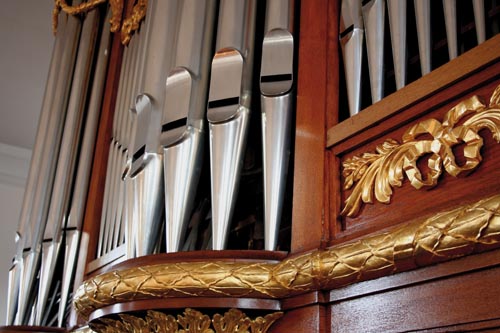|
More and more now concert reviews, most of all during the
summer, do not represent a "time to escape" through music. They represent
an opportunity to link music with land, history and present, research of
the past and current events, taking from the "classic" repertoire, too
often left out of our life, a value of cultural enrichment and not only a
lofty pastime. This premise is essential to a series of reviews which,
without making too much noise, have obstinately become a tradition and a
strong point in our land (though similar reviews are flourishing here and
there). Such as the one entitled "Organ Itineraries in the Province of
Bologna", born in 1986 thanks to the commitment and dedication of late
Master Giorgio Piombini who unceasingly during 24 years organized organ
concerts and sacred music in the various churches of the Bolognese
Apennines and Bologna.
The review (organized by the Associazione
Arsarmonica with the precious collaboration of the Gruppo di Studi Savena
Setta Sembro) began as always in late spring, on May 29th, at the Sala
Bolognese, and has brought during the whole summer its faithful listeners
in the valleys of the Apennines (from Monte S. Giovanni to the sanctuary
of the Madonna dei Boschi, from Montorio a San Benedetto Val di Sembro,
from Tossignano to the Boschi di Granaglione, from Trasasso to the
sanctuary of Madonna Serra Ripoli, from Baragazza to Brigola to
Scascoli to Monzuno) to then return to Bologna in the fall and end
its kilometric adventure on December 13th in the Parish church of Pino,
proposing with various organs, young performers and musicians of fame and
of different nationalities who came not only from the best organ music
schools in Italy but in France, Belgium, Spain and Holland as well.
|
 |
| Those who think
that "Organ Itineraries" mean ‘simple’ concerts are mistaken: beyond
the clear communicative intention and the rediscovery of the territory,
the precise intention of the organizers is to rediscover and give back a
voice, often following careful repair, to ancient organs disseminated
plentifully in valleys and on mountains, testimonies of a desire for music
born in long ago periods and too often forgotten. Twenty historical organs
have up until now reacquired their old splendour and even this year, for
example, in October two important historical instruments were recuperated:
the organ of Giovanni Chianei (1769) of the Church S. Agostino of
Imola and the organ of Giuseppe Sarti (1845) of the Church of the SS.
Trinità of Bologna, repaired by Paolo Tollari and inaugurated on October
30th in the presence of His Excellency Cardinal Carlo Caffarra, Archbishop
of Bologna. And to insist on the more cultural vocation of the review (in
which some events are introduced by a true 'guide to listening'), concerts
have always been done at the same time as conventions and conferences
organized in collaboration with the Department of Arts, Music and
Performance of the University of Bologna, with the cultural association
Saggiatore Musicale, |
with the International Museum
of Music, the International Academy of Organ Music S. Martino. Through
these collaborations are organized masters' classes of grand masters, like
the one organized this year which was dedicated to Frescobaldi by Luigi
Ferdinando Tagliavini on the monumental organ of the Basilicata S.
Giovanni in Laterano in Rome. Who then thinks that Arsarmonica presided by
Fabiana Ciampi (with the precious collaboration of Ida Zanini Piombini who
with her untiring will has followed a path initiated years ago by Giorgio)
is "limited" by proposing ancient music is mistaken because one of the
objectives is also to promote new music. In this sense, the CD of Daniele
Venturi "Quattro Lembi di Cielo" was presented at the Music
Museum and the "Missa Eclectica", composed by twelve young
composers who, inspired by Gregorian chants, have celebrated the
anniversary of Santa Cecilia creating pieces for the Proprium and the
Ordinarium. An activity at 360°, and an Association getting ready to
celebrate in 2010 a quarter of a century dedicated to rediscovering not
only small places but also a whole web of celebrations, devotions,
meetings, sociality and community life sometimes unexpected and that
enrich our territories, and the life of music. |
